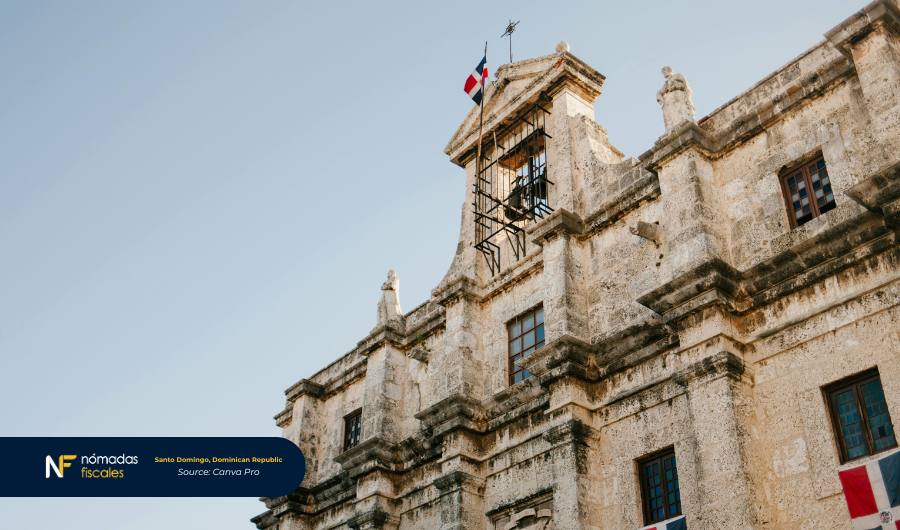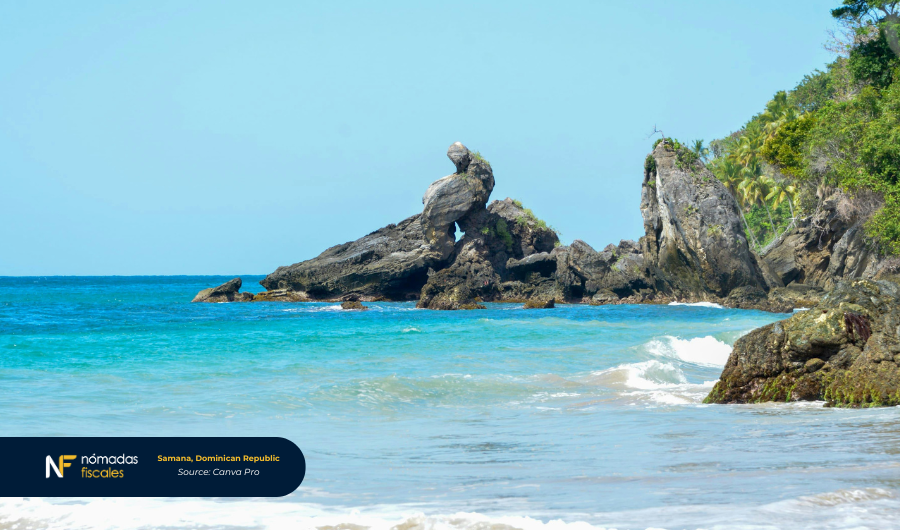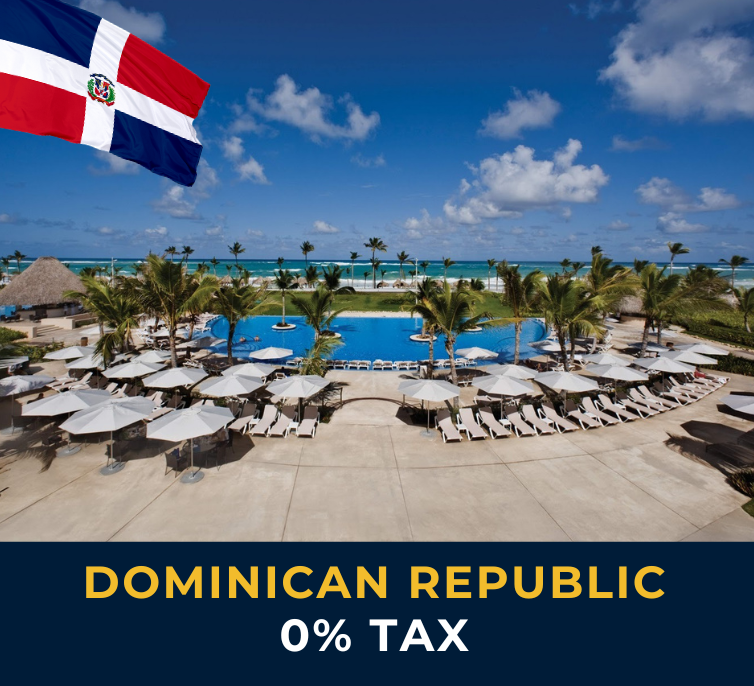One of the most relevant aspects for those interested in finding a new residency is the famous “quality of life.”
Will it be too cold? Will the people be friendly and sociable? Will it be too expensive to live there?
This is why the Dominican Republic is attracting more and more Tax Nomads with an offer that’s hard to resist:
- Living (almost) tax-free indefinitely.
- Obtaining a second Dominican passport in record time.
- Affordable cost of living.
- Caribbean beaches with an average annual temperature of 25 degrees Celsius.
- A relaxed lifestyle with cheerful and welcoming people.
- Investment opportunities throughout the country.
- Spanish language, decent level of English, and widespread use of the US dollar.
Don’t believe it? Keep reading because I’ll explain in detail how it works:
Taxation in the Dominican Republic
The Dominican Republic is one of those wonderful tax residencies where we can take advantage of a territorial tax system, meaning we only pay taxes on what we generate within the country (i.e., zero tax for overseas income).
However, in this case, territoriality does not apply to all types of income for tax residents in the Dominican Republic, as income from financial gains and investments is subject to taxation.
New tax residents only enjoy territorial taxation for their first 3 years in the country.
But don’t get discouraged yet!
There is a way (actually, several ways) to enjoy complete territorial taxation with no expiration date: obtaining a residency visa as a rentier, pensioner, or investor.
Moreover, by obtaining one of these residencies (which we will detail later), not only you will have full territorial taxation, but you will also be granted benefits such as:
- 0% Transfer Tax on the first property purchase.
- 50% exemption on the Real Estate Property Tax.
- 50% exemption on the Capital Gains Tax (generated within the country).
- Total exemption on the payment of dividends and interests (generated within the country).
- Partial exemption on vehicle import taxes.
- A second passport in 6 months (only as an investor).
Considering that the Dominican Republic also does not have CFC Rules, is not part of the CRS (does not share banking information at the moment), and does not have an exit tax, the immediate conclusion is:
We can reside in the Dominican Republic receiving ANY type of income, with ANY company from ANY place outside the Dominican Republic without paying anything.
Now then, it is necessary to understand that, although thousands of entrepreneurs currently benefit from this structure in the country, the proper approach would be for the foreign company to pay some taxes in its country of incorporation. This is because, in theory, if it also has a 0% tax rate, we could lose the territoriality benefit on that income.

Residency Permits in the Dominican Republic and Requirements
Among the various residency permits in the Dominican Republic, the most notable are those for rentiers, pensioners, and investors.
Not only do these permits provide the greatest tax advantages, but they also offer permanent residency (renewable every 4 years).
The residency process can take about 6 months and involves 2 fundamental steps:
- Applying for a Residency Visa at the Dominican Consulate in your country of origin.
- Within 60 days of approval, travel to the Dominican Republic to present the original documents to the General Directorate of Migration (Santo Domingo) and complete the required medical examinations.
All visas share certain general requirements such as a Criminal Record Certificate, Passport, Medical Certification, Birth Certificate, Marriage Certificate, etc.
Additionally, specific requirements must be met depending on the type of visa:
Rentier Residency Visa
It is obtained by demonstrating that you receive “passive income” exceeding $2,000 per month over the last 5 years.
By “passive income,” we refer to income that does not come from work, but from movable or immovable property on a recurring basis (rent, dividends, interest, royalties, etc.).
It is possible to include a spouse and minor children (although the requirement increases by $250 for each additional individual).
Pensioner Residency Visa
It is obtained by demonstrating that you receive a lifetime private or public pension of more than $1,500 per month.
It is possible to include a spouse and minor children under the same criteria as the rentier visa.
Investor Residency Visa
It is obtained by investing at least $200,000 in a Dominican corporation (new or existing), in a tourism project, or in the purchase of a property authorized by the Ministry of Tourism (CONFOTUR law).
This visa can serve both as a residency by investment and as a citizenship by investment (see below for more details)

Dominican Passport: Naturalization and Requirements
Although the Dominican Republic passport is not among the most coveted in the world, it is vastly underrated when considering its advantages and the ease of obtaining it.
To qualify for naturalization, it is only necessary to have legally resided in the country for 2 years or just 6 consecutive months if residing with the Investor Visa (citizenship by investment) thanks to Law No. 1683 on Naturalization.
The Dominican Republic allows for multiple citizenships (and countries like Spain also allow dual citizenship with the Dominican Republic).
It is worth noting that the processes for obtaining citizenship are slow and may take more than 1 year from the application.
As mentioned earlier, it’s not the best passport, but it still offers a Plan B and access to a multitude of countries.
Furthermore, something that is often overlooked is that obtaining a Dominican passport qualifies you for accelerated naturalization in countries as interesting as Mexico or El Salvador (just 2 years).
Finally, upon obtaining citizenship, you are free to undo the investment made or change it for another without losing residency.
Dominican Republic Tax Residency Review
Territorial income taxation, permanent residency, passport, privacy… the Dominican Republic is the dream of every international tax advisor.
Therefore, it has become one of our favorite options worldwide and competes with other territorial tax systems such as those of Paraguay or Panama.
While not all Nomad Tax profiles will be able to access its advantages and visas, for those who qualify, it is an option to seriously consider.
Are you interested in obtaining residency, citizenship, or setting up a company in the Dominican Republic?
Or would you prefer a complete analysis of your situation to discover the best option for you?
In either case, we can help!
Simply request your FREE INITIAL CONSULTATION BY CLICKING HERE, or contact us directly via WhatsApp or through the form below.
Contact us
In the Dominican Republic, taxes are mainly paid on income generated within the country, thanks to its territorial income tax system.
Opting for visas as a rentier, pensioner, or investor allows you to enjoy additional tax benefits such as:
- 0% Property Transfer Tax on the first property purchase.
- 50% exemption on Real Estate Property Tax.
- 50% exemption on Capital Gains Tax generated within the country.
- Total exemption from paying dividends and interests generated within the country.
- Partial exemption from vehicle import taxes.
Additionally, the country has no CFC rules, does not participate in the CRS, and has no exit tax.
This makes the Dominican Republic an attractive destination for those seeking tax residency with tax benefits.
The 3 best types of residence visas are: rentier, pensioner, and investor.
Rentier Residency Visa:
Requirements: Demonstrate passive income exceeding $2,000 per month over the last 5 years.
Pensioner Residency Visa:
Requirements: Receive a private or public lifelong pension of more than $1500 per month.
Investor Residency Visa:
Requirements: Invest at least $200,000 in a Dominican corporation, tourist project, or property authorized by the Ministry of Tourism (CONFOTUR Law).
These visas offer tax benefits and the possibility of obtaining permanent residency, renewable every 4 years, as well as advantages such as tax exemptions and accelerated access to a second passport.
Opening a company in Dominican Republic costs between 2,000 and 3,500 dollars.
The price varies depending on the type of company being established and the activity you wish to undertake.
To obtain a Dominican passport through naturalization, you need to have legally resided in the Dominican Republic for at least 2 years, or only 6 months if you have the Investor Visa.
You need to provide documents such as a criminal record certificate, passport, medical certification, and more.
The naturalization process may take more than 1 year from the application.
The Dominican Republic allows multiple citizenships, making it easy to maintain your original citizenship.

